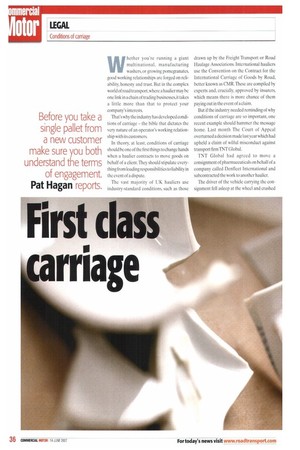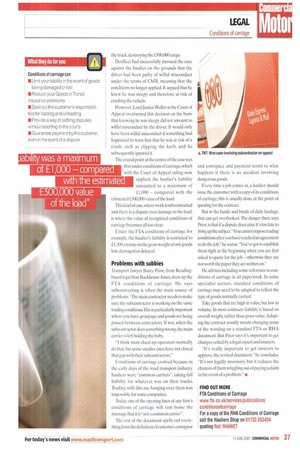First c rriage
Page 36

Page 37

If you've noticed an error in this article please click here to report it so we can fix it.
Before you take a
single pallet from
a new customer
make sure you both understand the terms of engagement.
Pat Hagan reports.
Whether you're running a giant multinational, manufacturing washers, or growing pomegranates, good working relationships are forged on reliability. honesty and trust. But in the complex world of road transport, where a haulier may be one link in a chain of trading businesses,it takes a little more than that to protect your company's interests.
That's why the industry has developed conditions of carriage — the bible that dictates the very nature of an operator's working relationship with its customers.
In theory, at least, conditions of carriage should be one of the first things to change hands when a haulier contracts to move goods on behalf of a client. They should stipulate everything from loading responsibilities to liability in the event of a dispute.
The vast majority of UK hauliers use industry-standard conditions, such as those drawn up by the Freight Transport or Road Haulage Associations. International hauliers use the Convention on the Contract for the International Carriage of Goods by Road, better known as CMR. These are compiled by experts and, crucially, approved by insurers, which means there is more chance of them paying out in the event of a claim.
But if the industry needed reminding of why conditions of carriage are so important, one recent example should hammer the message home. Last month The Court of Appeal overturned a decision made last year which had upheld a claim of wilful misconduct against transport firm TNT Global.
TNT Global had agreed to move a consignment of pharmaceuticals on behalf of a company called Denfleet International and subcontracted the work to another haulier.
The driver of the vehicle carrying the consignment fell asleep at the wheel and crashed the truck, destroying the £30(),000 cargo.
Denfleet had successfully pursued the case against the haulier on the grounds that the driver had been guilty of wilful misconduct under the terms of CMR, meaning that the conditions no longer applied. It argued that he knew he was sleepy and therefore at risk of crashing the vehicle.
However, Lord Justice Wailer at the Court of Appeal overturned this decision on the basis that knowing he was sleepy did not amount to wilful misconduct by the driver. It would only have been wilful misconduct if something had happened to warn him that he was at risk of a crash, such as clipping the kerb, and he subsequently ignored it.
The crucial point at the centre of the case was that under conditions of carriage, which with the Court of Appeal ruling now applied, the haulier's liability amounted to a maximum of £1,000 — compared with the estimated E300,000 value of the load.
This kind of case, where work is subcontracted and there is a dispute over damage to the load, is where the value of recognised conditions of carriage becomes all too clear.
Under the FTA conditions of carriage, for example. the haulier's liability is restricted to /1,300 a tonne on the gross weight of any goods lost, damaged or delayed.
Problems with sub bies
Transport lawyer Barry Prior, from Readingbased legal firm Backhouse Jones, drew up the FTA conditions of carriage. He says subcontracting is often the main source of problems. The main contractor needs to make sure the subcontractor is working on the same trading conditions.This is particularly important where you have groupage and goods are being passed between contractors. If not, when the subcontractor does something wrong, the main carrier is left holding the baby.
"[think most clued-up operators normally do that, but some smaller ones have not closed that gap with their subcontractors."
Conditions of carriage evolved because in the early days of the road transport industry hauliers were "common carriers", taking full liability for whatever was on their trucks. Trading with this axe hanging over them was impossible for some companies.
Today. one of the opening lines of any firm's conditions of carriage will ram home the message that it is"not a common carrier".
The rest of the document spells out everything from the definition of customer,consignor and consignee and payment terms to what happens if there is an accident involving dangerous goods Every time a job comes in, a haulier should issue the customer with a copy of its conditions of carriage; this is usually done at the point of quoting for the contract.
But in the hustle and bustle of daily haulage, that can get overlooked.The danger then, says Prior, is that if a dispute does arise it's too late to bring up the subject "You cannot impose trading conditions after you have reached an agreement to do the job," he warns. "You've got to establish them right at the beginning when you are first asked to quote for the job — otherwise they are not worth the paper they are written on."
He advises including some reference to conditions of carriage in all paperwork. In some specialist sectors, standard conditions of carriage may need to be adapted to reflect the type of goods normally carried.
Take goods that are high in value, but low in volume. In most contracts liability is based on overall weight, rather than gross value. Adapting the contract usually means changing some of the wording on a standard FTA or RHA document. But Prior says it's important to get changes vetted by a legal expert and insurers.
"It's really important to get insurers to approve the revised document," he concludes. "It's not legally necessary, but it reduces the chances of them wriggling out of paying a claim in the event of a problem.".
FIND OUT MORE FTA Conditions of Carriage wwwla.co.uk/services/publicationsi conditionsofcarriage For a copy of the RHA Conditions of Carriage call the Hauliers Shop on 01733 263434 quoting Ref: RHANET


























































































































































































